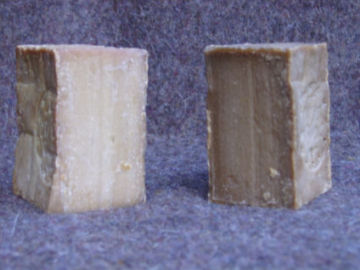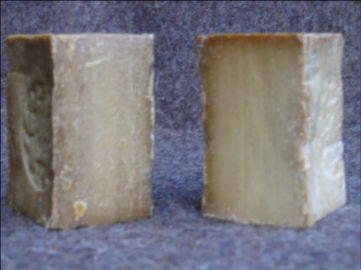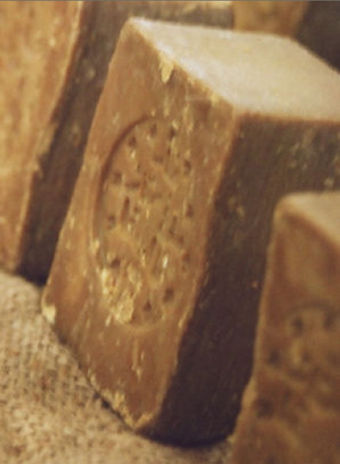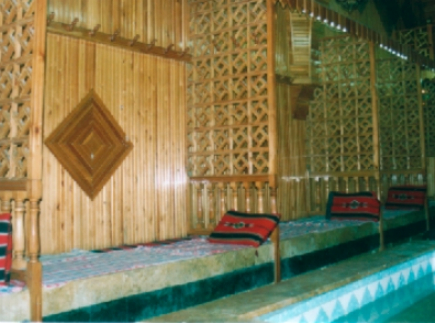Soap from Aleppo symbolises something special for many people, as it stands for a much older tradition than many of the detergents and washing agents that are in use nowadays. Olive oil and laurel oil are usually fundamental ingredients. Aleppo soap (Arab: «sabun ghar») - the literal meaning would be laurel-oil-soap) is boiled with olive and laurel oil. Colorings, artificial flavors, foam stabilisers, perfumes etc. are unfamiliar materials for traditional Aleppo soap boilers for two reasons. One is that they work with traditional formula. And then, their old-fashioned technology doesn´t encourage the blessings of modern chemical engineering, either. The simple, but labor-intensive production manufactures soap which skin friendly and environmentally friendly qualities are widely appreciated. This does not mean that these qualities go without saying, and don´t meet reservations. The EU has banned the use of laurel oil as a cosmetic ingredient, by its 76/768/EWG directive. Laurel oil is suspected to provoke allergic reactions in certain cases.
 We used to think that these days, there were still about sixty smaller soap factories in Aleppo. As for the really traditional ones however, it really seems to be hardly a dozen by now. This is the more striking, as actually, worldwide interest is in fact rising. It seems unlikely that the small, traditional producers even have a noticable share in the overall output of Aleppo soap. Many producers have moved to the hinterland of Aleppo, and built much larger factories there. We used to think that these days, there were still about sixty smaller soap factories in Aleppo. As for the really traditional ones however, it really seems to be hardly a dozen by now. This is the more striking, as actually, worldwide interest is in fact rising. It seems unlikely that the small, traditional producers even have a noticable share in the overall output of Aleppo soap. Many producers have moved to the hinterland of Aleppo, and built much larger factories there.
The ratio of olive oil and laurel oil varies from one sort to the other. Usually, Sabun Ghar contains between 2 to 40 per cent of laurel oil, and therefore between 98 to 60 per cent olive oil – as far as oil is concerned. potash is another important part of the formula. Traditionally, the higher the laurel ratio, the more costly the production - and the more valuable the soap. As a soap manufacturer has put it: "Why simply eating rice, when you can have some good meat with it?" The outside of the soap grows darker, as it ripens – provided that it is exposed to some daylight.
Olive oil soap contains rather small amounts of laurel oil, if any. Chances are that it does contain at least a small share, as this is considered an appreciation of the product. Olive oil is used for exports to the EU more commonly than laurel oil soap.
Some production pictures, from the olive pressing to the soap factory »
As a rule, the soap boilers in Aleppo work during winter – from November to March of each year. It takes about six to nine months for the products to dry on racks in well aerated arches.
|
|


 We used to think that these days, there were still about sixty smaller soap factories in Aleppo. As for the really traditional ones however, it really seems to be hardly a dozen by now. This is the more striking, as actually, worldwide interest is in fact rising. It seems unlikely that the small, traditional producers even have a noticable share in the overall output of Aleppo soap. Many producers have moved to the hinterland of Aleppo, and built much larger factories there.
We used to think that these days, there were still about sixty smaller soap factories in Aleppo. As for the really traditional ones however, it really seems to be hardly a dozen by now. This is the more striking, as actually, worldwide interest is in fact rising. It seems unlikely that the small, traditional producers even have a noticable share in the overall output of Aleppo soap. Many producers have moved to the hinterland of Aleppo, and built much larger factories there.  olive oil is mixed with soda ashes in boiling tanks (normally industrial soda ashes these days), and boiled with up to 200 degrees C. under constant stirring, until the olive oil splits into glycerine and sodium salt. The adept decides when this process should be considered complete. Shortly before this is the case with Sapun Ghar, laurel oil is added to the hot substance. Even the bigger tanks usually don´t offer more than about 5000 kg capacity for this mixture. The soap mixture is now pumped from the tank to an even ground (often on an upper floor). Here, it is then flattened or smoothed. After the substance has hardened sufficiently, the soap blocks as we know them are cut and, the seal of the producer moulded into it.
olive oil is mixed with soda ashes in boiling tanks (normally industrial soda ashes these days), and boiled with up to 200 degrees C. under constant stirring, until the olive oil splits into glycerine and sodium salt. The adept decides when this process should be considered complete. Shortly before this is the case with Sapun Ghar, laurel oil is added to the hot substance. Even the bigger tanks usually don´t offer more than about 5000 kg capacity for this mixture. The soap mixture is now pumped from the tank to an even ground (often on an upper floor). Here, it is then flattened or smoothed. After the substance has hardened sufficiently, the soap blocks as we know them are cut and, the seal of the producer moulded into it.  It starts with a shower, after which the guest goes into the main room - often one with a domelight in the ceiling. Usually, a floor heating and warm stone benches add to the relaxation. A steam bath condition the skin and loosen the dandruff. This helps the work of the bath attendant. He cleans the skin with a glove of rough goat hair and an immense quantity of laurel oil soap. In the end, the guest puts on a bath robe and relaxes in a comfortable room, with some black tea or salty Ayran.
It starts with a shower, after which the guest goes into the main room - often one with a domelight in the ceiling. Usually, a floor heating and warm stone benches add to the relaxation. A steam bath condition the skin and loosen the dandruff. This helps the work of the bath attendant. He cleans the skin with a glove of rough goat hair and an immense quantity of laurel oil soap. In the end, the guest puts on a bath robe and relaxes in a comfortable room, with some black tea or salty Ayran.
No comments:
Post a Comment